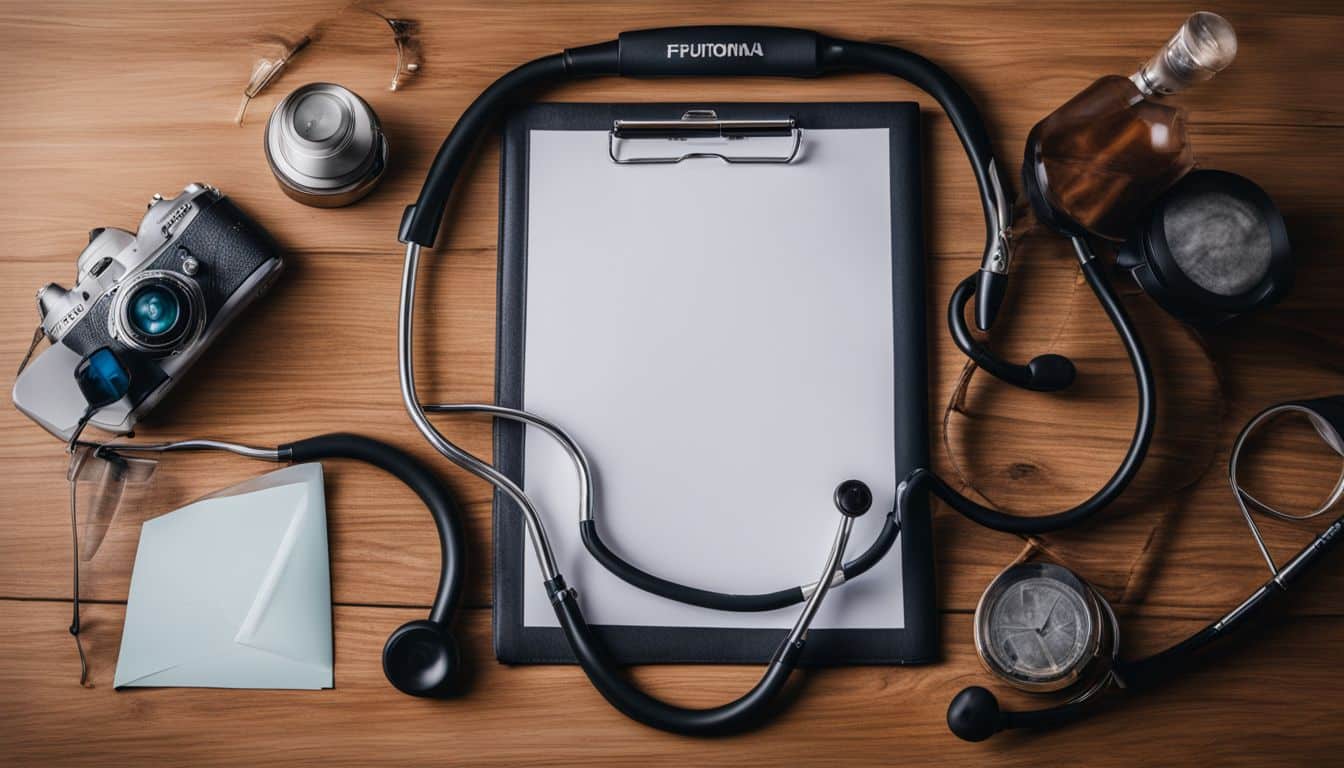What Information Should A Nhs Doctors Note For University Have?
Feeling unwell can make keeping up with university studies tough. A sick leave note from doctor can help you get the time off you need. This article will show you what information this note should contain and how to get one from the NHS.
Keep reading to learn more!
Key Takeaways: Understanding the Importance of a University Sick Note

Understanding the importance of a university sick note is crucial for students. It can make a difference in ensuring academic success and receiving support during times of illness.
Why a university sick note is necessary
A university sick note proves you were ill and needed to miss classes. It shows your teachers that your absences were for a genuine medical reason. This note comes from a GP, which stands for general practitioner.
They’re doctors who know about many health problems.
The sick note helps you in several ways. It can let you make up missed tests or hand in assignments late without penalty. NHS provides these notes through GPs or hospitals when you’re too unwell to attend university.
Having this proof is key to getting fair treatment and support during your studies.
How it can benefit students
Understanding the need for a university sick note sets the stage for realising its advantages. Students can use these notes to verify their health issues officially, ensuring they get fair treatment in academic matters.
This safety net helps them focus on recovery without stressing over grades or attendance records.
Getting a valid sick note means students can access support services more easily, such as extensions for assignments or special arrangements during exams. It also encourages them to register with a general practitioner (GP) and stay updated on vital immunisations like HPV vaccines and flu jabs, promoting overall well-being.
How to Obtain a University Sick Note

To get a university sick note, follow the process below:
– Provide medical evidence
– Have a doctor validate it
– Receive the sick note or letter
– Register with a GP and seek other health services if needed
Process of obtaining a sick note
Getting a sick note from the NHS for university is straightforward. You just need to follow these steps carefully.
- See your doctor or a medical professional if you feel unwell. They can give you advice and decide if you need time off from studies.
- Book an appointment with your GP or visit a walk – in centre if it’s urgent. This is where they will assess your health.
- Talk honestly about how you’re feeling during the visit. Mention all symptoms that affect your ability to study.
- The doctor might ask for medical proof or more details about your condition. Make sure to provide everything needed.
- If the doctor agrees, they will write a sick note or a medical certificate for you. This note proves you’re too ill to attend university.
- Collect the sick note from the GP’s office. Sometimes, they can send it directly to you or through electronic communication like email.
- Submit this sick note to your university as soon as possible. Follow their process for handing in medical documentation.
After submitting your sick note, keep in touch with your university about your situation and when you can return to studies.
Next, we’ll talk about registering with a GP close to your uni and other health services you might need while studying.
Submitting medical evidence
To submit medical evidence, first gather all the required documents from your doctor or NHS health provider. This might include notes on visits, treatments received, and advice given about rest or medication.
Make sure each piece of evidence is clear and includes important details like dates and specific health issues addressed.
Next, check with your university for how to send them this information. Some may ask you to upload documents online through their website while others might prefer email or physical copies.
Always follow up to make sure they got everything needed. Now it’s time for a doctor to validate your sick note.
Validation by a doctor
A doctor must check your health issue before you get a sick leave note. They will ask about your symptoms and might need medical tests. This is to make sure the note matches your situation.
The GP or another healthcare provider does this part. It is important because it helps schools understand why you need time off.
After the examination, the doctor writes the sick note if they think you are too ill to attend classes. They include details like how long you should stay home. Make sure to keep this note safe as your university will ask for it.
Also, update your GP if anything changes with your health while you’re away from school.
Receiving the sick note or letter
You get your sick note or letter after a doctor checks you. They confirm if you’re too ill to attend university. This paper might also come from NHS services through electronic communications.
It shows the date you saw the doctor and how long you should stay off school.
Next, submit this note to your university’s administration office. Ensure they receive it so they know why you’re absent. Keep a copy for your records in case there are any questions later on.
Registering with a GP
To get a university sick note, first sign up with a general practitioner (GP). Find one close to where you live. You’ll need to fill out some forms with your personal details. This includes your name, address, and medical history.
Your GP is part of the National Health Service (NHS). They provide medical care for various illnesses.
After signing up, visit your GP if you’re unwell. They can offer treatment or advice on health services like pharmacies or emergency care. Your GP will decide if you need a sick note for university.
If other health problems arise, your GP might refer you to specialists like physiotherapists or psychiatrists. Now, let’s look into seeking other health services if needed.
Seeking other health services if needed
In addition to visiting a GP for a sick note, other health services may be necessary. This could include seeking advice from sports physicians or psychotherapists if appropriate. It’s important to access the specific healthcare professionals needed for comprehensive care and support.
Moreover, students can also consider contacting family planning clinics or pharmacies for certain health needs. These facilities offer various services, such as flu jabs and advice on childhood immunisation.
Remember that it’s essential to explore all available options based on individual health requirements.
Detailed Guide on Obtaining a University Sick Note from NHS
To obtain a university sick note from the NHS, start by making an appointment with your GP. During the appointment, explain your situation and request a sick note for your university.
Your GP will assess your condition and may provide a medical certificate online if necessary. If approved, the sick note will outline the duration of time you are unfit to attend university due to illness.
Make sure to clarify any queries with your GP regarding the sick note before leaving.
Once you have obtained the sick note, promptly submit it to your university’s relevant department as per their guidelines. Ensure that all details are accurate and up-to-date on the form for validity purposes.
It’s essential to keep a copy of the sick note for personal records in case it is required for future reference or assessment purposes at the university.
Conclusion
Obtaining a doctor’s note from the NHS for university is essential. Having a university sick note can benefit students and help them access necessary support. The process of obtaining a sick note involves submitting medical evidence, seeking validation by a doctor, and registering with a GP.
It’s crucial to familiarise yourself with how to obtain this important document in case you ever need it during your time at university.
FAQs
1. What is an NHS doctor’s note for university?
An NHS doctor’s note for university is a medical certificate given by your GP or hospital to prove you’ve been ill or received emergency treatment.
2. Why do I need vaccines like MMR and MenACWY for university?
Universities ask students to be immunised against diseases such as measles, mumps, rubella (MMR), meningitis (MenACWY), and human papilloma virus (HPV) to keep everyone safe on campus.
3. Can I get my vaccine records from my GP for the university?
Yes, your general practitioner can provide records of your vaccinations like MMR, HPV, and MenACWY needed for university entry.
4. What should be included in my NHS doctor’s note?
Your NHS doctor’s note should include details about any illnesses, treatments like vaccines, sensitivity to light due to migraines or other conditions that affect your study.
5. How does privacy work with my health information at the university?
The General Medical Council ensures your health information stays private between you and healthcare providers unless there’s consent or an emergency situation.
6. Can I use telemedicine services if I’m away at university?
Yes! You can use telemedicine services through the internet service provider on your mobile device to contact GPs or pharmacists while studying at the university.


